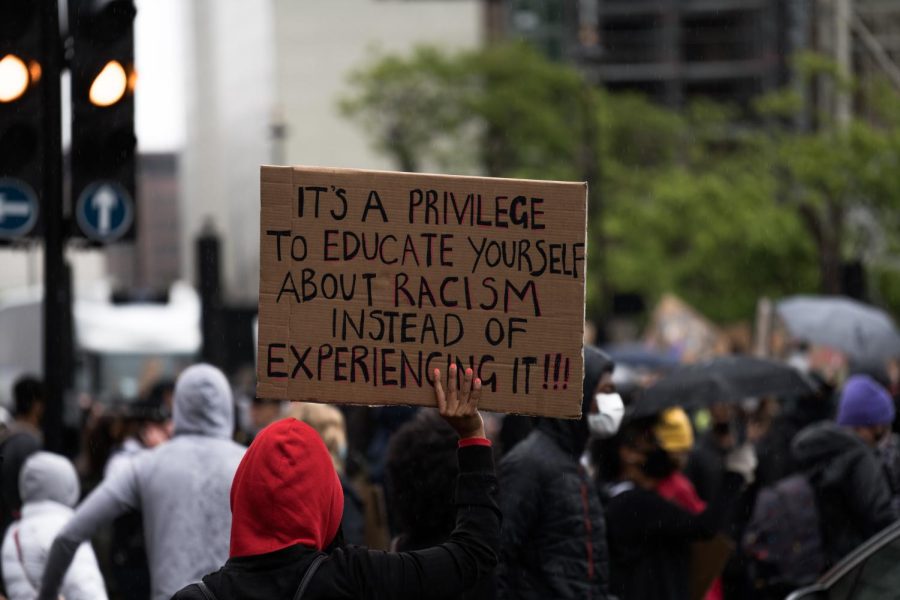Please stop asking your students of color to become educators in class
I just want to be a student, not an excuse to get out of doing your own work
A photo taken during a protest that states “it’s a privilege to educate yourself about racism, instead of experiencing it.”
I’ve attended primarily white institutions my whole life. I’m used to it, I know how to cope, but sometimes it can just be a little too much.
I know other students of color understand the feeling when the subject of race is brought up and all eyes turn to us when we have to speak on behalf of all communities of color.
To be clear, I do believe these sorts of conversations need to be happening. We cannot expect there to be any sort of sustainable change moving forward if people are not educating themselves on the injustices of our society.
Beyond your own research, if you consider yourself an ally to any sort of marginalized group, it is your responsibility to foster the space for these types of educational conversations to happen.
However, I always go through the internal struggle of how much I should be speaking on these topics in a classroom setting.
On one hand, this is not my job. I shouldn’t be put on a pedestal over my white peers to not only educate my professors but also explain these topics in a way that is palatable to white people. At the same time, I can’t help but think, what would happen if I didn’t do this?
If I didn’t take the time and energy –– each time –– to correct people, would someone else do it? Or would they just be allowed to live their life cultivating discriminatory beliefs.
Of course, it doesn’t stop there. I have to spend time thinking about the manner in which I engage in these types of conversions, or in most cases, how I correct people.
People are socialized to believe that marginalized people owe you a sugar-coated, polite response. If you are actively living your life in a way that continues a cycle of violence and injustice, I do not owe you anything.
In my experience, there are usually three different responses that happen when I give my input during these conversations:
One: They dismiss me.
Because what I’m saying differs from the same message they have been hearing from within the four white-washed walls they’ve lived in their whole lives, obviously what I say must be wrong. They would rather just forget about what I said because it’s easier than challenging their preconceived notions about race.
Two: They respond in a violent way.
It usually starts with gaslighting me, then moving to tone policing and ending with them walking away even more set in their prejudiced beliefs. Why do they believe that coddling white feelings is more important than working towards the liberation of Black and brown people?
Three: They shut down.
They resort back to –– once again –– placing their own feelings above actually addressing what the issue is. Usually, they cry, avoid eye contact and prove that white fragility is alive and well.
This leaves me with a few options here.
Do I provide an enormous amount of free labor and dumb down what I say in order to get the message across? However, if I do this, are they going to expect this from every person of color moving forward? Will I be promoting an unsustainable ideal and causing trauma for someone down the road, when a white person expects them to assume the role of an educator.
Do I stay silent? If I do this, I’m allowing them to sustain the ideals that make up our racist society. I feel like I am complacent in the violence, harm and bigotry that plagues our institutions.
Do I respond, in an educated and informed way, but risk the repercussions of their impetuous reaction? Once again, free labor and the added risk of having to absorb all the hatred that will be spewed my way.
All of this boils down to white people seeing people of color as less than human. As if we are not real people with experiences, emotions, or individual thoughts. We are seen as a monolith that exists for the sole purpose of catering to the needs of white people.
When we are continuously put into positions that require us to reveal massive amounts of trauma for the sake of someone else’s education, it sends a clear message that our life is not equal to our white counterparts.
It tells us it is okay to be exploited, that it’s normal to walk from class feeling empty and that we should expect this sort of treatment moving forward.
I’m tired of being an educator, tired of being tokenized and tired of having to defend my existence every single day.
I just want to be a student.
Gómez can be reached at [email protected]

Rosa Gómez is a second-year political science and journalism student. This is her first semester on The Spectator staff. She enjoys rainy days, reading and all things social justice!











